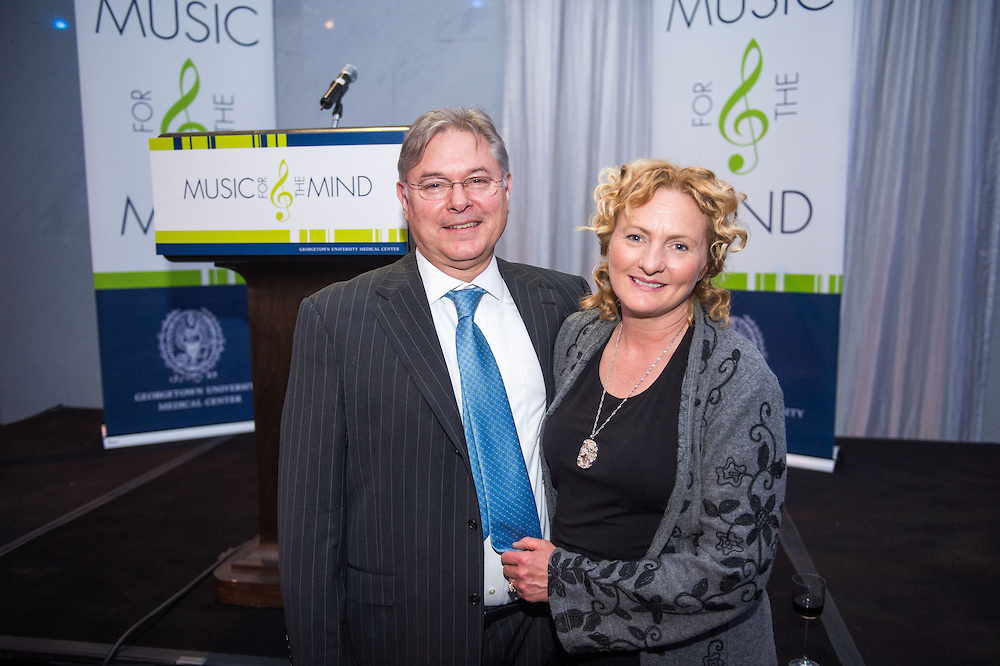Seeding the Work of GUMC's Young Neuroscience Investigators

Posted in GUMC Stories | Tagged Alzheimer's disease, dementia, Music for the Mind, neuroscience
(May 30, 2013) — Talk of continued successes punctuated the conversations of more than 150 guests at Georgetown University Medical Center’s (GUMC) third annual “Music for the Mind,” a spring fundraiser of music, cocktails and brain-healthy food to seed advances in the research of early career neuroscientists.
Charbel “Charlie” and Dina Moussa beamed at one another as they greeted a stream of well-wishers at the John F. Kennedy Center for the Performing Arts on May 18. Thanks to funding raised at the inaugural Music for the Mind event in 2011, Charlie E-H Moussa, MBBS, PhD, assistant professor of neuroscience at GUMC, received a $25,000 young investigators award he needed to elevate his research into how the human brain disposes of debris.
Moussa says the seed money helped finance the creation of a gene-based laboratory model to demonstrate precisely how the brain rids itself of amyloid beta — fragments of waste that accumulate as plaques in the brains of Alzheimer’s patients. These plaques, which are found in a range of neurodegenerative diseases, literally crowd out working brain tissue, causing dementia.
Moussa’s new research model attracted the attention — and funding — of international pharmaceutical company Merck & Co., which helped advance Moussa’s research.
Moussa discovered that several drugs FDA-approved for other uses also “turn on the brain’s garbage disposal” via a mechanism known as “autophagy” from the Greek word for “self eat.” In laboratory tests, the drugs Moussa tested triggered the brain cells to dump unwanted debris for 12 hours (it takes at least 24 hours for a cell to re-accumulate debris.) “This is a very, very efficient system,” Moussa says.
Capturing innovations inside the brilliant young minds of researchers like Moussa is what Music for the Mind is all about, says Howard J. Federoff, MD, PhD, to GUMC’s community of philanthropic friends attending the elegant evening.
Federoff, executive vice president for health sciences and executive dean of the school of medicine, noted that with 10,000 Americans turning 65 each day, neurologic diseases associated with aging are on the rise. This “silver tsunami” will triple the number of Alzheimer’s patients from the current 35 million to nearly 115 million in the next 30 years. Parkinson’s disease prevalence is expected to double by 2030. Traumatic brain injuries — which disproportionately impact younger people via vehicular accidents, sports injuries and combat — are sustained by 1.7 million Americans each year.
William and Dana Schreiner co-chaired the event. Before event-goers headed to the concert hall for a National Symphony Orchestra Pops tribute to Stephen Schwartz, composer of music featured in the plays Wicked, Godspell and Pippin, Bill Schreiner made a poignant plea. He asked for the “magnificent generosity” needed to spare future generations from the heart-wrenching duty of caring for elderly relatives with dementia from neurological disorders.
“Let’s keep that group as small as possible,” he said, noting the years his own family cared for his father, George, a leading physician, medical lobbyist and professor at Georgetown School of Medicine, who died of Alzheimer’s in 2012.
By Victoria Churchville, GUMC Advancement
